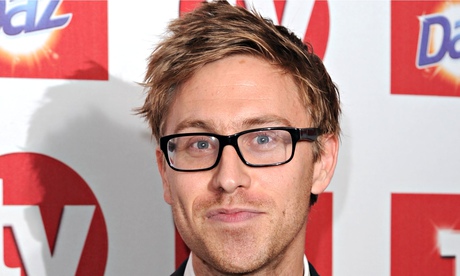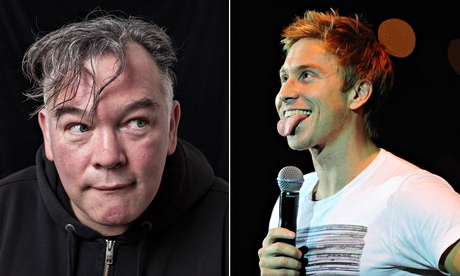I am meeting Russell Howard just days after he made headlines for walking off midway through a gig. He had not been billed in advance and had come to try out some new material in front of a pandemic-appropriate, small live audience. It didn’t last long. When the comedian spotted a woman filming him, he at first stopped to chastise her – “That’s literally the worst thing you can do” – and then left the stage saying that she had “ruined it”.
“It amazed me that it became a story,” Howard says. “I mean, it’s not like there’s anything going on in the world, but oh my God a wonky-eyed comedian asked a lady at a live gig to be in the moment … I was tired is the truth.”
On telly, Howard looks incapable of being tired. Apparently ageless, hugely physical with his performances and relentlessly funny, he has been a mainstay of the schedules for more than a decade. In person, thankfully, he is less of a caricature; calm, thoughtful, wearing prescription glasses. The last time we met was in January, under very different circumstances. It was in front of a huge live audience, and in a bizarre reversal of roles, he was interviewing me for his Sky One show, the Russell Howard Hour, which returns n week.
Of course, a lot has happened since then. His world tour had to be postponed because of the pandemic and he went to lockdown with his parents in Bath so that his wife, a doctor, could stay in their London home with her colleagues. “It’s very weird at the beginning because you just feel such unbelievable pride but such fear as well,” he says. “You see the nurses and the doctors in the full PPE gear. And it’s sort of bewildering to think that that’s your wife as well.”
His fee for Sky One’s Russell Howard’s Home Time, which aired during lockdown, went to several charities including one for the NHS. Made in difficult circumstances, it was nonetheless a respectable effort to put an uplifting show together via Zoom calls from Howard’s childhood bedroom. “The day of my 40th birthday, I was meant to be doing a sold-out arena in Amsterdam,” he recalls, “and I slept in my childhood bed.”
Spinning jokes out of dark places is what comedians do best and the hysteria of the 24-hour news cycle has offered plenty of opportunities – from grappling with Brexit to dealing with the pandemic. “There was that really interesting stat at the beginning, in terms of Priti Patel’s immigration policy, that you couldn’t go into this country unless you’re at a job over 26 grand,” he says. “The majority of jobs that it turns out were vital were below 26 grand. And there was this assumption that if you’re earning less than that, it’s not really a proper job. And yet it was what kept society going.”
While he cares deeply, he is careful not to be too worthy when using examples such as this in his standup. “What I like doing is talking about those things at gigs and trying to actually make it funny rather than make you applaud something you already know,” he explains. “A real issue with that kind of comedy at the minute is there’s so much ‘clapter’, where you just say a thing and in a certain way, like: ‘I think everybody should be treated fairly in the world’ people ...” He gestures people clapping with self-satisfaction.
“When people are laughing, you don’t have time to do anything else because you’re lost in the giggle ... there’s such a truth to it because if you laugh, it is true, it’s tangible. We’ve all been in situations where, miraculously, the sunshine of laughter has appeared and made the horror sit less heavily.”
He recalls one such moment, at his grandfather’s funeral in 2017. “For whatever reason, my cousin Stuart had worn a leather jacket to the funeral and my brother Dan, as we’re carrying Granddad’s coffin went: ‘Nice jacket, Stu,’ and our shoulders all went a bit. And then Dan goes: ‘You come as Lovejoy?’ And I’m, like: ‘Seriously, everyone shut the fuck up’, but it was somehow a connection. My brother had the audacity to break the tension of heartbreak with stupid silliness. And then my nan died six months later. Stuart arrives late wearing the same jacket and all of us are instantly having to lift our shirts because we’re laughing so much. It provided a bit of daftness amongst the horror.”
Moments such as this are delicate and he is keen to emphasise that it is hard to create the sort of comedy that really touches people. “Only Fools and Horses probably added years to their life – the joy it gave them,” he says, still thinking of his grandparents. “John Sullivan when he was writing it in his shed, he probably had no idea that he was making people’s Christmases.
“You want it to be that important to people, but you can’t approach it like that ... So I see that in Richard Pryor and I see that in Michelle Wolf or Bill Burr or Dave Chappelle or Daniel Kitson.”
In recent times, comedians, including Chappelle, have been heavily criticised for jokes deemed to have gone beyond the pale of acceptable topics for humour. In Chappelle’s recent Netflix specials, the American comedian joked about the transgender community and the #MeToo movement, to much opprobrium from sections of the audience. “He was kind of one of the few people that could do it ... just sort of say: ‘I’m going to play for comedians.’ It’s kind of fascinating,” Howard says. “I think he got like 0% on Rotten Tomatoes from the critics and then 99% from the people. And then won a Mark Twain prize [for American humour]. It’s bizarre.”
As social media increases the level of scrutiny that comedians face, those who remain unfazed by it are held in high regard by contemporaries and fans. “The wonderful thing about someone like Bill Burr is that you can disagree with some things he says, and that’s fine,” Howard explains, “but that is challenging in every aspect of the world now. Comedians are being reviewed like they’re presidents and presidents are getting away with behaving like comedians.”
Howard is fascinated by the nuts and bolts of how comedy works – and he lights up when talking about the process of writing jokes, something that has provided him with solace in difficult times. “I certainly realised during lockdown that life is so much easier if you have a purpose,” he says. “Even if it is an artificial purpose, that’s not the worst thing in the world ... The way I got through lockdown is I went through every note that I’d written in my phone since 2006 that I’d never finished and just tried to, day by day, write stuff on it. I really enjoyed it.”
That theme of purpose makes me think of Jordan Peterson, the controversial Canadian academic and author, who featured in the Modern Masculinity series I produced. It was that series that led to me being interviewed on the Russell Howard Hour. I ask what he makes of Peterson and the controversy around him. “We now live in a strange world, where if you say: ‘You know it’s interesting, that Jordan Peterson says life is about finding a purpose and and trying to be the best at that,’ it’s like: ‘Oh, my God, so you mean to say that you …’ and then they can pull up things that he said elsewhere [as if you were endorsing them, too]. Some of [what he says] is ridiculous and some of it’s interesting and that’s how most people are.
“That’s what’s frustrating about so many things,” he continues. “Everyone’s multilayered and everyone’s nuanced. You’re super-liberal on some things and super-conservative on other. This idea that you can only be in that gang or this gang is ludicrous, and it isn’t the truth. The real world isn’t social media.
“[But] it doesn’t it matter what you say. If somebody wants to skin you, they can skin you.”
Series four of The Russell Howard Hour premieres on 10 September at 10pm on Sky One and NOWTV, whilst Russell’s return to the UK with his rescheduled world stand-up tour, Respite, begins on the 25 February 2021. More info at russell-howard.co.uk











